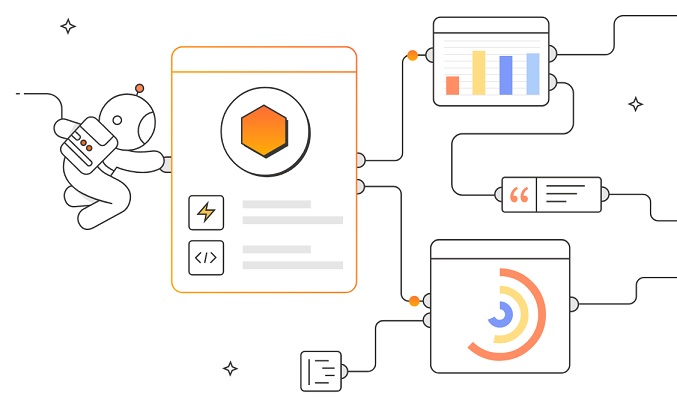Amazon Web Services (AWS) announced the general availability of Amazon Q, a generative artificial intelligence (AI)-powered assistant for accelerating software development and leveraging companies’ internal data.
"The State of the API Report sheds light on the realities of API usage and how APIs are delivering value to modern organizations," said Abhinav Asthana, co-founder and CEO of Postman. "More companies are adopting an API-first approach to software development, and for the second year in a row, outperforming organizations that haven't. Beyond the technical advantages, organizations are also seeing a direct impact on their bottom line, reporting their APIs as revenue generators. This outlook, combined with the rising use of AI tools, is fundamentally changing our relationship to software and the way we build it — and APIs are at the center of this shift."

Key findings include:
APIs are a moneymaker for most
Almost two-thirds of respondents say their APIs generate revenue. Of those respondents, 43% said their APIs generate over a quarter of company revenue. In the financial services and advertising sectors, revenue was especially important. It was judged the No. 2 measure of public API success, just after usage.
API pricing increasingly matters
When deciding whether to integrate with an API, 47% of respondents said price is a top consideration. That's up from 41% in each of the past two years. While other factors ranked higher than pricing, this finding may reflect a more cost-conscious API consumer in the wake of tech's economic contraction.
Most API professionals are using AI to help code
60% of respondents say they're using generative AI. More than half of those use it to find bugs in their code, and over a third are relying on AI to generate code. When asked what type of project excites developers in the coming year, the top answer was building AI-powered apps.
The outlook for API investment has brightened
92% of respondents say investments in APIs will rise or stay the same over the next 12 months, which is up from 89% last year. This increase may reflect a sense in some quarters that the worst of tech's economic contraction has passed. At the same time, fewer respondents expect to cut API investments this year.
API security is improving, but some sectors have work to do
API security improved for most respondents, with the frequency of incidents down in 2023. But some sectors fared worse than others. Automotive, education, and retail were sectors where survey-takers said monthly incidents occurred at higher rates than average.
Number of API-first leaders swells by almost half
11% of respondents defined themselves as API-first leaders, up from 8% in each of the previous two years. This elite group excels in almost every metric, including how fast it can produce APIs and how quickly it can recover when an API goes down.
Methodology: Produced by Postman, the report is based on two sources: a survey of over 40,000 developers and API professionals from around the world and anonymized, aggregated data from the Postman API Platform. The survey was fielded over approximately five weeks in May and June 2023.
Industry News
Red Hat announced the general availability of Red Hat Enterprise Linux 9.4, the latest version of the enterprise Linux platform.
ActiveState unveiled Get Current, Stay Current (GCSC) – a continuous code refactoring service that deals with breaking changes so enterprises can stay current with the pace of open source.
Lineaje released Open-Source Manager (OSM), a solution to bring transparency to open-source software components in applications and proactively manage and mitigate associated risks.
Synopsys announced the availability of Polaris Assist, an AI-powered application security assistant on the Synopsys Polaris Software Integrity Platform®.
Backslash Security announced the findings of its GPT-4 developer simulation exercise, designed and conducted by the Backslash Research Team, to identify security issues associated with LLM-generated code. The Backslash platform offers several core capabilities that address growing security concerns around AI-generated code, including open source code reachability analysis and phantom package visibility capabilities.
Azul announced that Azul Intelligence Cloud, Azul’s cloud analytics solution -- which provides actionable intelligence from production Java runtime data to dramatically boost developer productivity -- now supports Oracle JDK and any OpenJDK-based JVM (Java Virtual Machine) from any vendor or distribution.
F5 announced new security offerings: F5 Distributed Cloud Services Web Application Scanning, BIG-IP Next Web Application Firewall (WAF), and NGINX App Protect for open source deployments.
Code Intelligence announced a new feature to CI Sense, a scalable fuzzing platform for continuous testing.
WSO2 is adding new capabilities for WSO2 API Manager, WSO2 API Platform for Kubernetes (WSO2 APK), and WSO2 Micro Integrator.
OpenText™ announced a solution to long-standing open source intake challenges, OpenText Debricked Open Source Select.
ThreatX has extended its Runtime API and Application Protection (RAAP) offering to provide always-active API security from development to runtime, spanning vulnerability detection at Dev phase to protection at SecOps phase of the software lifecycle.
Canonical announced the release of Ubuntu 24.04 LTS, codenamed “Noble Numbat.”
JFrog announced a new machine learning (ML) lifecycle integration between JFrog Artifactory and MLflow, an open source software platform originally developed by Databricks.
Copado announced the general availability of Test Copilot, the AI-powered test creation assistant.




